Results
-
 £149.40
£149.40O Helga natt - Adolphe Charles Adam
O Holy Night is a very well-known Christmas carol. The origin of the carol is French beginning with the words: "Minuit! Chrtiens, c'est l'heure solennelle". It is about the birth of Jesus and was written in 1843 by a wine merchant and poet by the name of Placide Cappeau (1808 77). He turned to the composer Adolphe Adam (1803 56) and asked him to write a suitable melody. The result was brilliant and the carol was premiered in Cappeau's home town Roquemaure in 1847 by the opera singer Emily Laurey. Based on Cappeau's French text, the English version was written in 1855 by an American Unitarian (Calvinist) minister by the name of John Sullivan Dwight (1813 93). Adolphe Adamwas the son of the pianist and composer Louis Adam (1758 1848), who did not want his son to follow in his foot-steps as a musician. However, Adolphe wanted otherwise, and already at the age of 17 he was accepted to study at the music conservatoire in Paris. He was a student under Franois Adrien Bo eldieu and composed several comical operas that became successful. After the July-revolution 1830 Adam moved to London. He worked for a couple of years before returning to Paris, where he founded a new opera house in 1847, the Th tre national. After the revolution in 1848 it had to close and Adam was ruined, why he had to go back to composing. In 1856 he concluded the ballet Le Corsaire, which together with the ballet Giselle are his most performed works today.
Estimated dispatch 7-14 working days
-
 £83.00
£83.00El Gato Monts (The Wild Cat) - Manuel Penella
In a famous moment from Manuel Penella's 1916 opera El Gato Monts ("The Wildcat"), a matador sings exuberantly to his beloved young gypsy woman that he will fight the bulls for her. In this marvelous adaptation, Shelley Hanson combines the march melody from this scene along with another melody from the opera in creating a well-balanced and appealing work for the concert stage.
Estimated dispatch 7-14 working days
-
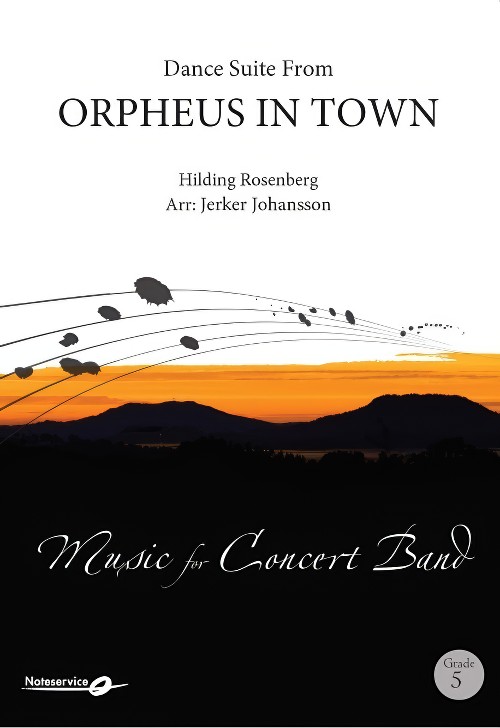 £242.50
£242.50Orpheus in Town, Dance Suite from (Concert Band - Score and Parts) - Rosenberg, Hilding - Johansson, Jerker
Dance Suite in Seven Movements. Op.75. Orpheus In Town. In 1936 the Stockholm Concert Hall was given its most distinguished artistic adornment, Carl Milles' Orpheus fountain. A Greek god lets his voice and the sounds of his lyre float over the rush and bustle of the big city far up in Ultima Thule. Two choreographers at the Stockholm Opera, Julian Algo and Vera Sager, had a brainwave. Why should Orpheus merely be a statue, a symbol of the beauty and inspiring power of music, why not give the myth about him its special Stockholm chapter as well? This is what happened: On the stage we see the columned facade of the Concert Hall and in front of it the statue group with Orpheus and the eight enraptured listeners. Suddenly the figures come to life, jump down from their pedestal and dance into the crowd at the marketplace. Orpheus, who is consumed by longing for Eurydice, begins looking for his beloved, first among other well-known sculptures in town, then in restaurants and nightclubs. At last he thinks he recognises her in a fashionable society woman and brings her to the Concert Hall. However, faced with the threat of having to spend her life in bronze at Orpheus' side, she runs away. She wasn't Eurydice after all. Or was she? For this ballet, which had its first performance at the Stockholm Opera in 1938, Hilding Rosenberg wrote vital and entertaining music in a style which is unusually to the point, and with a bright and strong orchestration. The music in the Dance Suite from Orpheus in Town is taken from the dance scenes at the nightclub: guests and a bartender perform, finally also Orpheus and his entourage. The suite consists of: 1. Rhythm of the Times (2.00); 2. Bartender's Dance (1.30); 3. Girl's Dance (1.00); 4. Dance of the Negress (2.30); 5. Trio Dance (1.30); 6. Tango (2.00); 7. Finale (1.30). Total duration: 14.00.
Estimated dispatch 7-14 working days
-
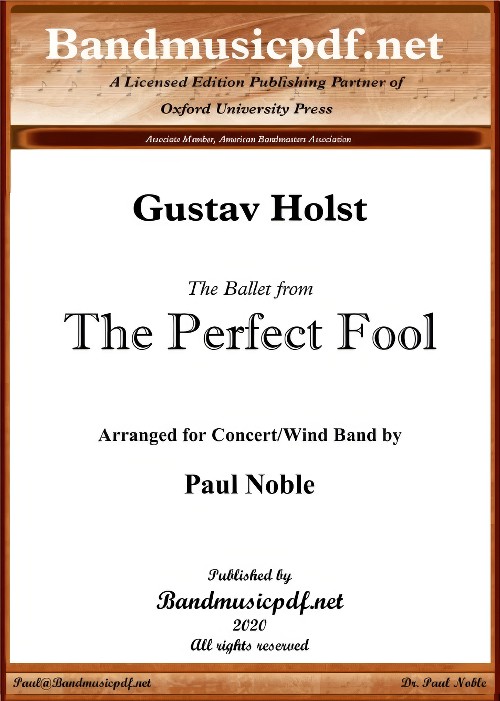 £150.00
£150.00The Perfect Fool, The Ballet from (Concert Band - Score and Parts) - Holst, Gustav - Noble, Paul
The music for The Perfect Fool is taken from an opera by the same name, written by English composer Gustav Holst over the period of 1918 to 1922. The opera received its premiere at the Covent Garden Theatre, London on 14 May 1923. This arrangement consists of the three distinct dances: Dance of Spirits of Earth, Dance of Spirits of Water, and Dance of Spirits of Fire. They embody the power, intensity, mystery and sheer beauty that define this piece. This arrangement includes the original celesta and harp parts. However, the celesta may be substituted with piano at the octave, and the vibraphone covers the significant harp solos.
Estimated dispatch 7-14 working days
-
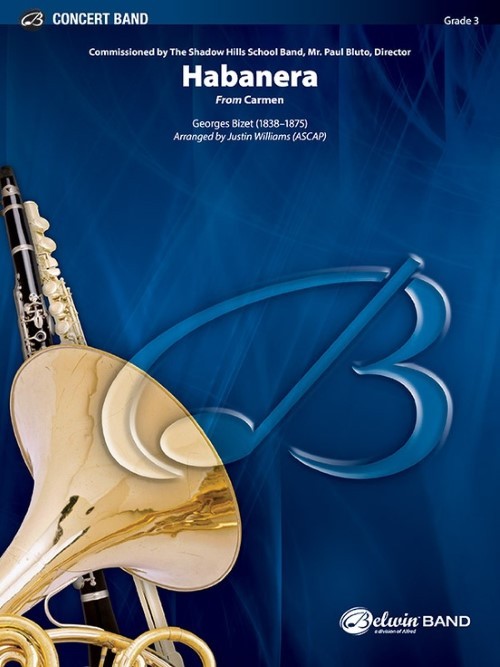 £64.50
£64.50Habanera (Concert Band - Score and Parts) - Bizet, Georges - Williams, Justin
French composer Georges Bizet's four-act opera, Carmen , remains one of the most popular and performed works in the classical canon. This piece is perhaps the most popular portion of the opera. Its playful character and flirtatious mood are exposed in this contemporary setting.Duration: 3:00
Estimated dispatch 7-14 working days
-
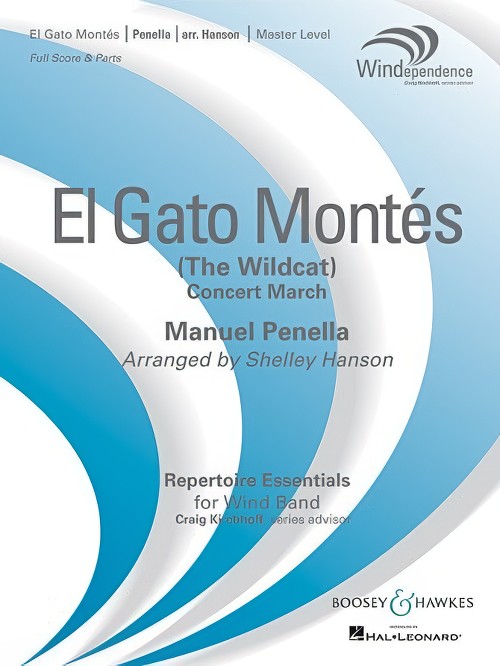 £83.00
£83.00El Gato Montes (The Wildcat) (Concert Band - Score and Parts) - Penella, Manuel - Hanson, Shelley
In a famous moment from Manuel Penella's 1916 opera El Gato Montes (The Wildcat), a matador sings exuberantly to his beloved young gypsy woman that he will fight the bulls for her. In this marvellous adaptation, Shelley Hanson combines the march melody from this scene along with another melody from the opera in creating a well-balanced and appealing work for the concert stage.Duration: 3:30
Estimated dispatch 7-14 working days
-
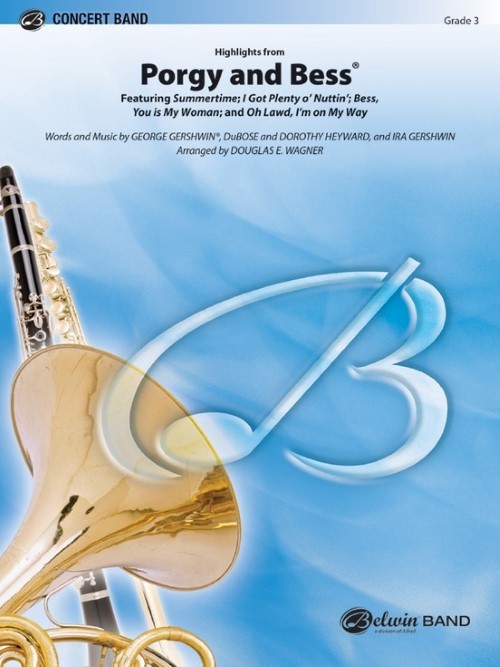 £77.50
£77.50Porgy and Bess, Highlights from (Concert Band with Optional Choir - Score and Parts) - Wagner, Douglas E.
From its first performances in 1935 to its return to the Broadway stage in 2012, the American folk opera Porgy and Bess has endured as a national musical treasure, acclaimed by critics and enjoyed by audiences worldwide. This medley for concert band (with optional choir) includes four popular classics from the score, arranged in the order they appear in the opera: Summertime; I Got Plenty O' Nuttin'; Bess, You Is My Woman; Oh Lawd, I'm On My Way. With or without the optional choir parts, this arrangement is a winner!Duration: 5:15
Estimated dispatch 7-14 working days
-
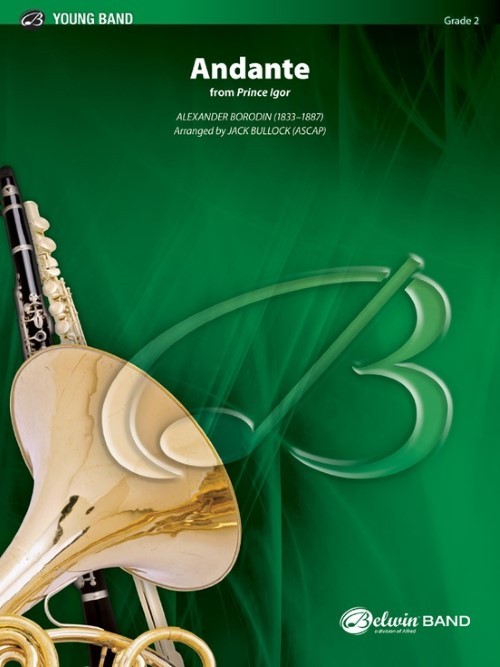 £50.50
£50.50Andante (from Prince Igor) (Concert Band - Score and Parts) - Borodin, Alexander - Bullock, Jack
Alexander Borodin (1833-1887) was a well-known Russian composer, particularly for his opera, Prince Igor. Borodin was in the middle of composing the piece when he suddenly died. Rimsky-Korsakov and another Russian composer, Alexander Glazanov, completed the unfinished score and the opera had its debut in November of 1890, three and a half years after his death. During the overture prelude, a beautiful flowing melody from Act III, entitled Andante, is an emotional addition to the young band literature. Most musical!Duration: 3.00
Estimated dispatch 7-14 working days
-
 £139.99
£139.99La Gazza Ladra (The Thieving Magpie) (Concert Band - Score and Parts) - Rossini, Gioachino - Cesarini, Franco
In the monumental overture to the opera La Gazza Ladra (The Thieving Magpie) Gioachino Rossini employs themes from the opera itself in order to prepare the audience for the material to come. The overture contains themes that stay long in the memory of the listener, as well as spectacular use of the famous Rossini crescendo. This wonderful arrangement for concert band from Franco Cesarini retains all of La Gazza Ladra's original charm, and is ideal as a concert opener.Duration: 10:00
Estimated dispatch 7-14 working days
-
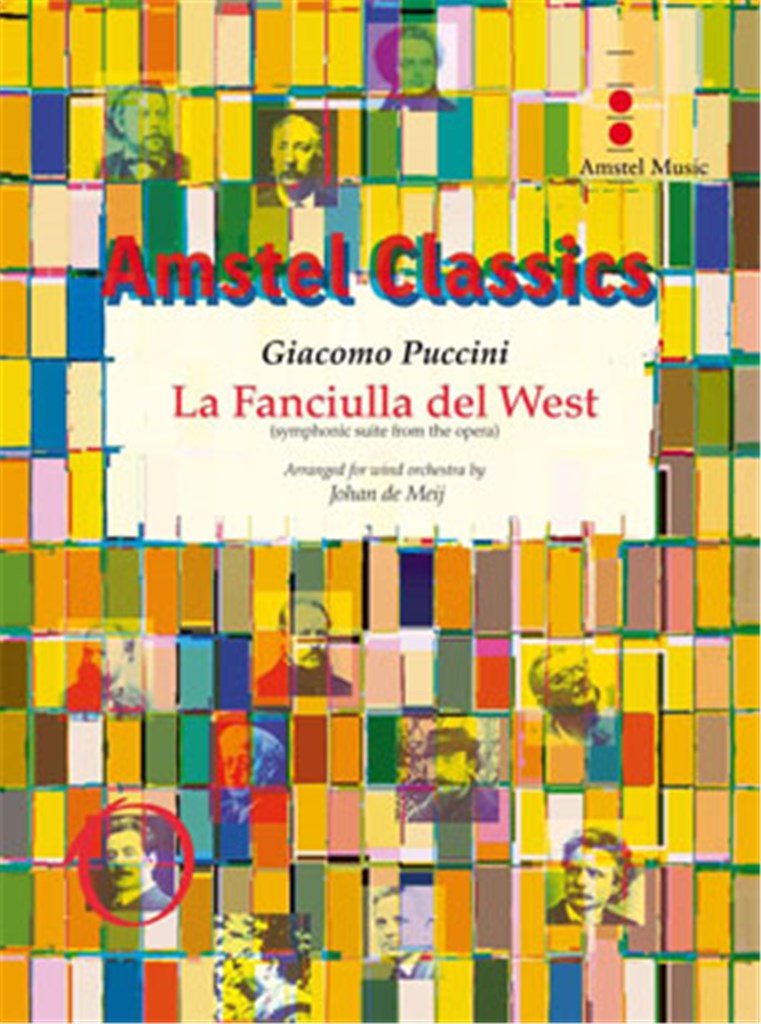 £173.00
£173.00La Fanciulla del West (Concert Band - Score and Parts) - Puccini, Giacomo - De Meij, Johan
Following the success of Madame Butterfly, Giacomo Puccini (1858-1924) composed the opera La Fanciulla del West, a dramatic love story based on the Wild-Western play, The Girl of the Golden West. This arrangement for concert band by Johan de Meij is a fantastic symphonic suite of music from the opera. Duration: 16.15
Estimated dispatch 7-14 working days
